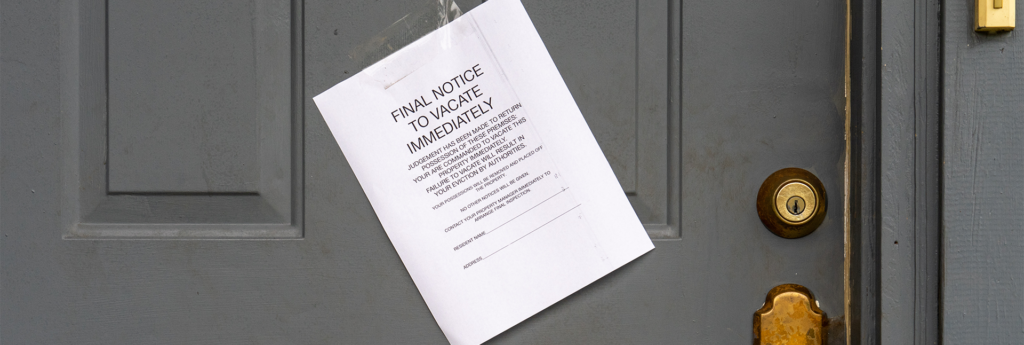
The Eviction Process in Florida: A Step-by-Step Guide to Understanding Your Rights and Responsibilities
Navigating the eviction process in Florida can be a challenging journey for both landlords and tenants. It’s important that you understand your rights and responsibilities under the state law to ensure that any actions taken are compliant and fair.
Florida’s legal framework provides clear guidelines on how a landlord can justifiably evict a tenant from rental property, but each step must be carefully followed to avoid any legal repercussions.
Your journey through the eviction process will typically start with a thorough review of the lease or rental agreement, which should detail all of the conditions and terms that might be grounds for eviction.
Should a situation arise where eviction seems to be the necessary course of action, initiating the process correctly is vital.
You need to know the proper notices to serve, how to respond if you receive an eviction notice, and what the process will look like if it escalates to an eviction lawsuit.
Each phase of the process has its own set of rules and timelines that must be respected.
Key Takeaways
- Knowing the detailed steps of the eviction process in Florida helps prevent legal missteps.
- Awareness of the state law governing evictions ensures you uphold your rights and fulfill your obligations.
- Understanding the aftermath of an eviction, including financial and emotional impacts, prepares you for the realities of the process.
Understanding Florida’s Eviction Laws
Navigating the eviction process in Florida means understanding the legal framework. You’re going to need a grasp on both the grounds for ending a tenancy and what protections you, as a landlord, have under state law.
Grounds for Eviction
In Florida, as a landlord you have the legal right to evict a tenant for a few specific reasons:
- Nonpayment of rent: Tenants have a grace period of 3 days to pay rent after receiving a notice from you before you can take further action.
- Violation of lease terms: If your tenant breaks the rules of your lease, you can issue a 7-Day Notice To Comply or Vacate. If a similar issue happens again within 12 months, you can move toward eviction.
- Termination of lease: When the lease is up, if the tenant doesn’t have provision for renewal, you can ask them to leave.
- Conduct resulting in material harm: If your tenant’s actions are seriously damaging the property or are a threat to others, this can be grounds for immediate eviction.
Remember, these are legal proceedings so you can’t just lock out your tenant one day out of the blue. You must follow the correct legal process.
Eviction Protections for Tenants
Florida laws do offer some protections for tenants facing eviction:
- Proper notice: You must provide your tenant with the correct notice, whether that’s the 3-day or 7-day one, before you can begin the eviction.
- Opportunity to correct issues: If it’s a matter of a lease violation, you typically have the chance to fix the problem.
- Court mediation: If your tenant is facing eviction, the legal process includes the opportunity for mediation, recommended before going to court to find mutual ground.
- Eviction defense: Tenants always have the right to present their case in court; there might be defenses available to them depending on the situation, like if the eviction notice was improperly served.
Understanding these aspects of the State of Florida‘s Eviction Laws as part of the Legal Process is critical. Be sure to respond promptly to any eviction notices and seek legal aid if needed, to ensure your rights are protected.
Lease and Rental Agreements
When renting out your property in Florida, it’s essential to establish clear terms and expectations through a well-crafted lease or rental agreement. This document serves as a roadmap for your tenants, outlining their rights and responsibilities while protecting your interests as a property owner.
Types of Rental Agreements
Your lease is a powerful tool for maintaining order and protecting your property. Be vigilant in addressing common lease violations, such as:
- Lease Agreement: A lease agreement provides stability by locking in specific terms, such as rent and rules, for a fixed period, typically 12 months. This arrangement benefits both parties by ensuring predictability and minimizing unexpected changes.
- Month-to-Month Tenancy: This flexible arrangement allows you or your tenant to make changes, like adjusting rent or ending the agreement, with just a month’s notice. It’s ideal for situations where long-term commitments aren’t feasible or desirable.
Consider your goals and the current rental market when deciding which type of agreement best suits your needs.
Enforcing Lease Terms
Your lease is a list of dos and don’ts. Here are some common slip-ups that can land you in hot water:
- Payment Delays: Establish clear consequences for late payments, such as late fees, and consistently enforce them to encourage timely rent collection.
- Unauthorized Tenants or Pets: Regularly inspect your property and promptly address any unauthorized tenants or pets to prevent potential damage or liability issues.
- Property Damage: Document the condition of your property before and after each tenancy. Pursue appropriate remedies, such as security deposit deductions or legal action, for damages that exceed normal wear and tear.
- Illegal Activities: Maintain open communication with your tenants and neighbors to identify and address any illegal use of your property promptly.
Stay proactive in monitoring lease expiration dates. If a tenant remains in the property beyond the lease term without signing a new agreement, their tenancy may default to a month-to-month basis, potentially impacting your long-term plans for the property.
Communicate with your tenants well in advance of lease expirations to discuss renewal options or make necessary arrangements for their departure.
By prioritizing clear communication and consistent enforcement of your lease terms, you can foster positive relationships with your tenants while protecting your investment in the Florida rental market.
Initiating the Eviction Process
When you’re ready to start an eviction, remember there are some specific steps you’ve got to follow to play it by the book in Florida. It’s not just about what you do—it’s all about how you do it, starting with how you give notice to the tenants.
Providing Proper Notice to Tenants
Let’s talk about the notice you need to give.
In Florida, you can’t just tell your tenants to pack their bags and leave—there’s a legal way to handle it.
You need to serve them with a Written Notice. This document is your first step, and it’s crucial because it tells your tenant what they’ve done wrong and what they can do to fix it—if that’s an option.
If you’re dealing with unpaid rent, you’ll be looking at giving a Three-Day Notice.
Notice Period and Types
Notice periods aren’t all the same—it depends on what’s gone sideways with the tenancy.
If rent’s overdue, you’ve got the Three-Day Notice I mentioned, but that’s just for nonpayment. No weekends or public holidays included in that countdown.
If it’s something else, like breaking the lease terms, you’ll need to give a Seven-Day Notice to Cure. That one’s telling your tenants they’ve got a week to sort out the issue, or they’ll need to move along.
Make sure these notices are delivered properly, otherwise, you might hit a snag down the road.
Responding to an Eviction Notice
When you’re hit with an eviction notice, it feels like your world is turning upside down, right? But, knowing how to respond can flip the script. You’ve got rights, and there’s a process to follow, so let’s break it down.
Tenant’s Rights and Obligations
Your Rights: As a tenant in Florida, once an eviction notice is served, you have the right to be informed about why you’re being evicted which could be due to non-payment of rent or a violation of lease terms.
You should receive a specific time frame, usually a 7-day notice, to either rectify the issue or vacate the premises.
Your Obligations: It’s your responsibility to act swiftly. Ignoring the notice won’t make it vanish; it will just complicate things.
If you choose to fight the eviction, you must respond by filing an “Answer” within the designated deadline, which is typically 5 days after receiving the Summons and Complaint.
Legal Grounds to Challenge Eviction
Challenge Validity: If you believe the eviction notice wasn’t justified or the landlord didn’t follow legal procedures, you can challenge its validity.
This may include disputing the reason for eviction or proving that you’ve been a compliant tenant.
Defend in Court: If it comes down to it and you’re facing a court hearing, bring your evidence: receipts, communications, photographs, etc. They’ll be crucial in showing your side of the story.
The Eviction Lawsuit
When you’re staring down an eviction lawsuit in Florida, understanding the process is crucial. You’ll be navigating court documents and might face a judge, so let’s walk you through what it really looks like to get from the complaint to a potential court order.
Filing the Complaint for Eviction
First up, you need to file the complaint for eviction in your county court. It’s the official start of the eviction lawsuit, where you’re stating why you’re asking the tenant to leave.
You’ve got to get all your ducks in a row here—detail out the reasons, be it unpaid rent or another lease violation.
Check out the Florida Eviction Process for the lowdown on putting together a solid complaint.
Attending the Eviction Hearing
After the complaint is filed and served, gear up for the eviction hearing. This is where you’ll make your case in front of a judge.
Having your facts straight and documents in hand is non-negotiable because the judgment will rely heavily on what’s presented here.
If the court sides with you, a court order will be issued to move forward with the eviction.
No show from the tenant? You may nab a default judgment in your favor.
After the Court’s Decision
After a Florida eviction order has been issued, the ball is in your court to follow through and regain possession of your property. Here’s what you need to know about what comes next.
Issuing Writ of Possession
Once you’ve got an eviction order in hand, the next move is getting a Writ of Possession.
The court’s going to give you this legal document that’s the green light for law enforcement to scoot the tenant out.
It’s like a court’s way of saying, “All right, you can have your property back.” This paper punch officially starts the clock for the tenant’s countdown to leave, usually within 24 hours.
Handling Tenant’s Property
Now let’s talk about the tenant’s stuff. If they leave belongings behind, don’t just toss them to the curb.
You’ve got to handle this delicately. Florida laws expect you to take care of those items for a bit—which means storing the property, sometimes for up to 15 days.
You want to avoid any drama about property damage, so make sure to do this by the book.
If the tenant doesn’t reclaim their property within the set time, you may be able to dispose of it or sell it, depending on the local rules.
Just be sure to document everything, just in case there are any disputes later on.
Financial Considerations for Landlords
When you’re faced with evicting a tenant, you’ve got to think about the money side of things, because let’s face it, evictions can hit your wallet hard.
You’re looking at filing fees, potential losses from a vacant property, and decisions around the security deposit.
Calculating the Costs of Eviction
First up, if you’re going through the eviction process, you’re gonna have to cough up some cash for filing fees.
These can be a bit of a pain and vary in price, generally falling anywhere between $185 and $400. Here’s a quick breakdown of potential fees:
Expected Eviction Filing Fees:
- Small Claims: $55 – $185
- County Court: Up to $300
- Circuit Court: Around $400
Remember, these are just the tip of the iceberg. If the situation escalates and you need a sheriff to step in, there’s an extra charge for that too.
And don’t forget, while your property is wrapped up in this eviction drama, it’s not generating any income.
That rented property of yours isn’t paying its way when it’s tied up in legal battles, so you’ve got to factor in lost rent too.
Managing the Security Deposit
Alright, let’s talk about the security deposit. You’re probably wondering what you can and can’t use it for.
Well, you can use it to cover unpaid rent and damages that go beyond wear and tear.
But be careful—Florida law stipulates you’ve got to give the tenant a detailed list of deductions within 15 to 60 days after they scoot out. Here’s what you need to do:
- Inspect the property after the tenant leaves.
- Document any damages.
- Itemize deductions and send the list to your tenant.
Stick to this like glue to potentially save yourself a headache later on.
If you get this wrong, you could end up coughing up more cash than the security deposit—like, double its amount. And trust me, that’s not a situation you want to find yourself in.
Dealing with Special Cases
When navigating the Florida eviction landscape, you’ll run into some unique situations. Especially when it comes to illegal activities or the lack of a formal lease, knowing the ins and outs is crucial.
Evicting Tenants for Illegal Activities
If you’re dealing with a tenant engaged in illegal acts on your property, like drug manufacturing or significant property damage, you need to act fast.
Florida law allows for a swift reaction in these cases, but it still requires following specific legal steps.
You can issue a 7-Day Notice to Vacate, which doesn’t give the tenant a chance to resolve the issue—they must leave.
This protects your property from further damage and ensures you’re aligned with your property management responsibilities.
Eviction Without a Lease
What if there’s no lease? Maybe your tenant’s lease has expired, or perhaps one never existed.
In Florida, you can still move forward with an eviction. For non-payment of rent, you may give a 3-Day Notice to Pay or vacate.
If they fail to pay after this notice, you can proceed with the eviction process.
It’s essential to document every step carefully, as you’ll need to provide this evidence if the case goes to court.
Role of Law Enforcement
When it comes to evictions in Florida, law enforcement plays a critical role. They’re there to ensure everything goes by the book once a court order is issued. Let’s break down what this means for you.
County Sheriff’s Involvement in Eviction
The County Sheriff is a key player in the eviction proceedings.
Once a judge has given the green light with a court order, it’s the sheriff’s job to serve the eviction notice to you.
Essentially, they’re the bearers of the not-so-great news, but they’ve got to do it by law.
They ensure the eviction is carried out legally and peaceably, avoiding any Wild West scenarios at your place.
Eviction and Property Security
Post-eviction, securing the property falls into the hands of local law enforcement, mainly the Sheriff’s office.
After you’ve vacated the property, they’ll make sure it’s locked up and safe.
This step is crucial; it’s about protecting the place from damage or unauthorized entry, which you wouldn’t want happening to your stuff, right?
Remember, these guys aren’t the bad ones.
They’re just doing their job, upholding the legal procedure to ensure everything is square.
So, if the Sheriff shows up with an eviction notice, know that they’re following orders—court orders, that is.
Understanding the Emotional Impact
The eviction process can be incredibly emotional for everyone involved. For you as a landlord in Florida, it means the end of a business relationship and potential financial loss.
As a tenant, it signals a significant life change and uncertainty about shelter. Let’s break down the support both parties can tap into during this challenging time.
Support for Landlords
If you’re a landlord facing the tough decision to evict tenants, it’s not just a legal process; it’s also an emotionally taxing one.
You might feel stressed about the financial implications or worried about potential confrontations. Here are a couple ways to manage these emotions:
- Seek Professional Advice: Consulting with organizations that understand the eviction process in Florida can provide clarity and peace of mind.
- Peer Support Groups: Connect with fellow landlords through forums or local groups to discuss experiences and coping strategies.
Support for Tenants
As a tenant receiving an eviction notice, you might be feeling overwhelmed and anxious. But remember, you’re not alone. Here’s what you can do:
- Legal Assistance: Reach out to legal aid services, which can offer guidance on how to navigate the eviction timeline.
- Community Resources: Look for local community organizations that offer support to individuals facing eviction, whether that’s temporary housing, financial advice, or emotional counseling.
Facing an eviction is never easy, but knowing there’s support can make a world of difference. Whether you’re the one having to say goodbye to a property or are on the verge of losing your home, remember that it’s okay to seek help and lean on available resources.
Frequently Asked Questions
Navigating the eviction process in Florida can be tricky, but don’t worry—I’ve got the lowdown on what you need to know, from timeframes to potential costs.
What’s the usual time frame for an eviction to go through in the Sunshine State?
In Florida, an eviction process can vary in length, but if all goes smoothly for the landlord, it can take about a month.
After the proper notice is given, a landlord can file an eviction lawsuit, and then it’s a matter of scheduling and attending the court hearing.
Any insider tips on how to postpone an eviction notice in our neck of the woods?
If you’re trying to delay an eviction in Florida, your best bet is to communicate with your landlord or consult a legal professional.
However, one way to postpone is to file a motion in court if there was an error in the eviction process, but this is merely a temporary hurdle for the landlord.
What happens if you’re living somewhere without a lease and face eviction in Florida?
Living in Florida without a lease is considered a month-to-month tenancy. To evict you, your landlord still needs to provide a 15-day notice to vacate before filing an eviction lawsuit.
How do you handle evicting a relative that’s overstayed their welcome in your home?
Evicting a family member in Florida generally follows the standard eviction process. You’ll need to provide them with a proper notice to vacate, and if they don’t leave, file an eviction lawsuit in your county court.
Could you break down the costs of giving someone the boot from your property?
The cost to evict someone in Florida includes filing fees, service fees, and possibly attorney fees. On average, the eviction can cost around $351, but this can vary based on county fees and the complexity of the case.
What’s the deal after getting slapped with a three-day notice to leave your place?
In Florida, after receiving a three-day notice, you have three business days to pay the overdue rent or vacate the property. If you neither pay nor leave, the landlord can then initiate the official eviction process by filing a lawsuit.



